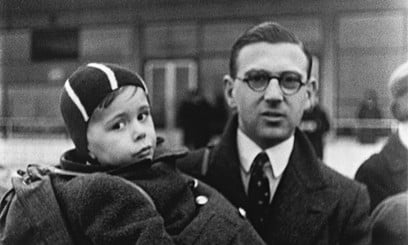
To listen to today’s reflection as a podcast, click here
Superman is back in theaters this week – an enduring symbol of a lone individual trying to right the world’s wrongs.
But not all superheroes wear capes. And comic books aren’t the only places you can find redemptive tales.
Nicholas Winton, a 29-year-old British stockbroker, was horrified by Hitler’s efforts to annihilate Europe’s Jews.
Unlike so many of his peers, Winton decided to do something.
Leaving the security of his home in the UK, he traveled to Nazi-occupied Czechoslovakia. Even as Jewish parents were being sent east to German death camps, Winton quietly herded their children onto trains heading west from Prague.
In 1938 and 1939, he courageously supervised the rescue of 669 Jewish children.
Their lives almost certainly would have ended at Auschwitz.
It wasn’t easy finding a landing place for so many kids. Winton brought them to England, where bureaucrats hassled him over their incomplete documentation. He resorted to various “creative means” to fill in the blanks.
Who would ultimately watch over these children? America refused his pleas to get involved. Britain finally consented to help. By means of newspaper ads, he quietly found foster families willing to raise them as their own.
Having secured the survival of almost 700 helpless strangers, Winton, incredibly, kept his exploits a secret for 50 years.
Only when his wife Gerte stumbled upon an old scrapbook in the 1980s was his heroism brought to light. The stockbroker, true to form, had kept careful notes, including the names and pictures of every rescued child.
Gerte decided to pass the information along to a journalist.
That ultimately led to a remarkable 1988 episode of the British TV program That’s Life. When you watch the show, Winton is introduced as the special guest. His extraordinary efforts are finally made public.
Then come the surprises. Winton has unknowingly been seated next to a woman he does not recognize – but whose life he had saved when she was a little girl. Then the woman seated on his other side reveals that she, too, is one of his rescues.
That’s when the host asks, “Is there anyone in the audience tonight who owes their life to Nicholas Winton?”
Here’s a link so you can watch what happens next: Story of Nicholas Winton BBC That’s life – Short version. Tissues are highly recommended.
Winton was knighted by Queen Elizabeth II in 2003.
At his death in 2015 at the age of 106, praise for Sir Nicholas came from all over the world.
“He was a hero of our time,” said Daniel Taub, Israel’s ambassador to the UK. “His legacy, as a point of light in an era of darkness, will forever be remembered.”
Prime minister Gordon Brown said, “Anyone who had the privilege of meeting him immediately felt admiration, respect, and were in awe of his courage. That courage led him to risk his life to save the lives of some of the most vulnerable people.”
His son Nick said concerning his father’s legacy: “It is about encouraging people to make a difference, and not waiting for something to be done, or waiting for someone else to do it.”
Jesus said in Matthew 25 (if we can paraphrase just a bit), “Whoever feeds, clothes, visits in prison, heals, serves, or delivers by train to the safety of a new family in a new land, the least of these brothers and sisters of mine, is actually doing such amazing things for me.”
Nicholas Winton lived long enough to see the children he rescued become adults, and to have children of their own, who now have had children and even grandchildren of their own.
Is it really possible to imagine blessing four generations?
It is. And it all begins today.
By God’s grace, you already have the superpowers to change the world.
Be brave.
